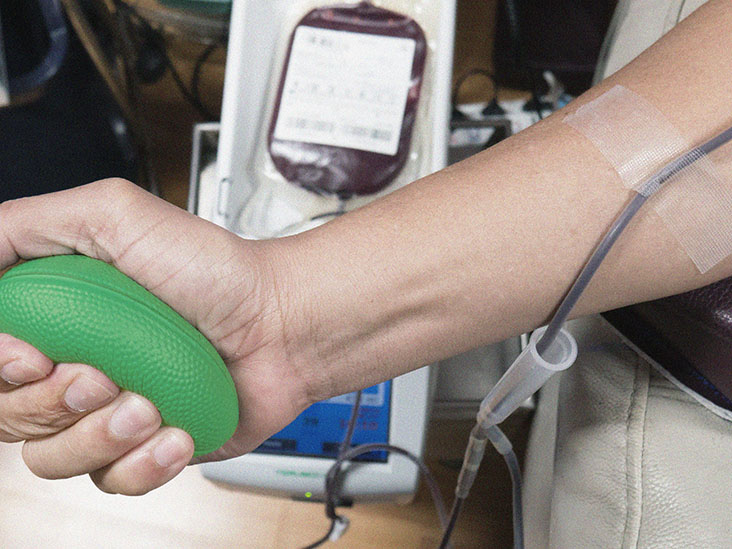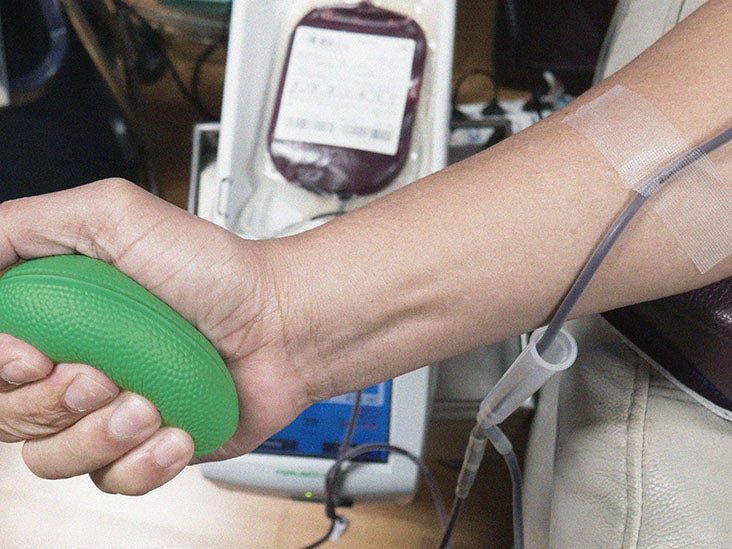

Previously, men who have sex with men (MSM) were unable to donate blood. They would have to abstain from sex for 12 months to be eligible for donation. However, challenges to blood supply and campaigns to alter eligibility have resulted in changes to the donation criteria. At present, the deferral period for MSM in the United States is now 3 months.
Donating blood is vital to public health as it is a safe, quick, and easy way to help doctors and nurses save lives. However, it is important that all blood donations are safe, with no
Previously, MSM would face deferral for 12 months and could only donate after a year of abstinence. The reasoning was that this would reduce the risk of passing certain infections, such as HIV, to the recipient. However, this policy discriminated against members of LGBTQIA+ communities.
Many sexual health and LGBTQIA+ organizations have campaigned against this deferral period. In 2020, the Food and Drug Administration (FDA) changed its guidelines to encourage more blood donations during the COVID-19 pandemic. The FDA reduced the 12-month deferral period to 3 months.
In this article, we discuss changes to blood donation rules and exclusion criteria and explain how these changes may affect LGBTQIA+ individuals wishing to donate blood.
Throughout the rest of this article, we will use the same binary language present in the blood donation guidelines. These guidelines do not consider nonbinary genders and require people to identify as male or female. The guidelines also use “male” and “female” to refer to gender rather than sex.
Under the FDA’s
There is no deferral period for males who have sex with females or females who have sex with other females.
Organizations such as the Red Cross understand that not all people identify as male or female and that there are many gender identities. They also acknowledge that sexual orientation should not determine blood donation eligibility. However, the FDA’s revised guidelines require donors to define themselves as either male or female.
People can self-identify or self-report their gender, allowing donors to register with the gender with which they most closely identify. There are no deferral criteria associated with being transgender, and eligibility is based on criteria relevant to the reported gender.
For example, individuals who register as male will be ineligible to donate blood if they have had sex with another male within the past 3 months. Individuals who identify as female and have sex with a male may be eligible to donate blood if they meet all other blood donation criteria.
According to the FDA guidelines, people who are intersex will also need to self-report a binary gender to donate blood but do not need to state that they are intersex. This also applies to people who identify as gender-expansive, genderqueer, gender fluid, agender, or nonbinary.
Individuals who are asexual can donate blood if they meet all other blood donation criteria.
The 3-month deferral is an attempt to reduce the risk of passing on infections. If a person acquires an infection in this window, current screening methods and other tests may not be able to detect the infection.
For example, the
Although testing has improved, and every unit of blood undergoes testing, it is still not 100% effective in detecting infectious diseases in blood from donors with very early infection. The 3-month deferral allows adequate time to detect potential infections and avoid passing them onto the blood recipients.
The emergence of AIDS in the early 1980s and the recognition that it could transmit via blood changed the U.S. blood system.
Due to a lack of effective screening methods, a poor understanding of potential risk factors, and heterosexist perceptions, the U.S. implemented a lifelong ban on MSM, preventing them from donating blood between
In
In April 2020, in light of COVID-19-related blood shortages, the FDA further reduced the deferral to 3 months to respond to the urgent need for safe blood products.
Some experts recommend that the deferral period should instead be 2 weeks and that blood donation criteria should undergo further revision to treat all people equally. Rather than a discriminatory blanket ban on certain individuals, they say that blood centers could evaluate donors based on “concrete risky behaviors.”
For example, a person who registers as male and has sex with another male once is unable to donate for 3 months. However, a person who registers as female could have unprotected sex with multiple partners over the same time with no knowledge of their sexual or health history and remain in the donor pool.
Groups such as the Human Rights Campaign advocate for the FDA to revise donation eligibility to evaluate the risk of sexual behaviors equally, without regard to sexual orientation or gender identity.
The FAIR (For the Assessment of Individualised Risk) steering group in the United Kingdom suggests the following changes to ensure a fair and safe screening system for everyone:
- asking all donors with new or multiple partners if they have had anal sex in the last 3 months, regardless of condom use
- deferring those who have had anal sex with a new partner or multiple partners in the last 3 months irrespective of their or their partner’s sex
- allowing those who have only had oral sex to donate
- asking all donors about their sexual history
According to general blood donation criteria, donors must:
In addition to individuals who have sex with MSM, the FDA’s revised guidelines also state that each of the following makes a person ineligible to donate blood:
- receiving a positive HIV test result
- engaging in sex for money or drugs in the last 3 months
- using needles to take drugs, steroids, or other substances that a doctor has not prescribed
- having sex with an individual who meets any of the above criteria in the last 3 months
- receiving a blood transfusion in the last 3 months
- having contact with the blood of another individual through needles or open wounds in the last 3 months
- getting a tattoo or piercing in the last 3 months
- having a history of syphilis or gonorrhea or receiving treatment for either in the last 3 months
Before donating blood, a person will need to complete a Blood Donor History Questionnaire (DHQ). Typically, the questions in the DHQ will ask a person about their health, recent travel, medications, and potential risk of infections.
The person’s answers will identify any potential risk factors and determine whether they are a suitable candidate to donate blood.
According to current policies, people can donate blood if it has been at least 3 months since they last had sex with a male who has sex with other males. If they pass other blood donation criteria, they may be able to donate blood.
Several organizations are advocating for changes to the blood donation guidelines so that they treat everyone equally, regardless of sexual orientation or gender identity.